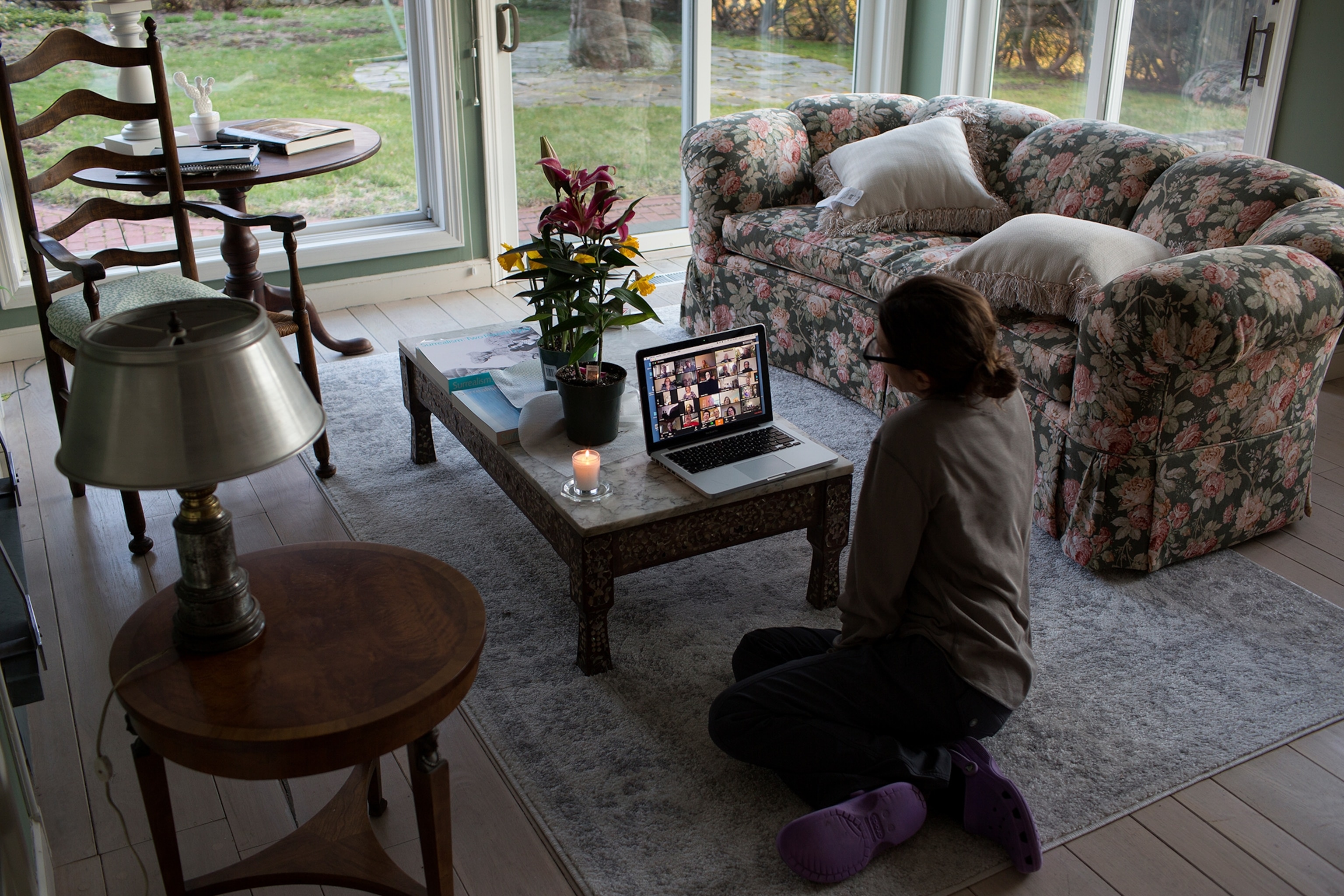
How should we mourn when coronavirus keeps us apart?
Gathering together to mark the passing of loved ones is critical to our emotional wellbeing. Could remote mourning be enough?
Paula Bronstein sat in the cemetery in a rented Ford Fusion, listening to the rabbi and taking pictures out her window. Her family members, in three cars behind her, followed the rabbi’s words on a conference call.
Bronstein, a photojournalist, had flown in from Thailand, knowing it might be the last time she’d see her father. George Bronstein had been born during the 1918 Spanish flu pandemic. Now 101, he was dying of natural causes, and she had been prepared to say goodbye—but not for a pandemic to come between them.

Upon her arrival in the United States, she’d self-quarantined because of the novel coronavirus, and could not see her dad in person. By the time he died, on March 30, the social distancing put in place to slow the virus was disrupting death observances. There would be no funeral home gathering, no synagogue service, no comforting visits to mourners sitting shiva. A handful of family members could attend the burial, provided they stayed in their cars. The rabbi, alone, could toss dirt on the burial plot—and only if he brought his own shovel.
As coronavirus ravages communities across the globe, rising fatalities and social distancing are upending memorials and sacred rituals around death and dying. That is transforming where and how the living grieve, altering the ways we process loss.
“I’ve seen a lot—I’ve experienced horrific things,” Bronstein says. She’s documented wars, earthquakes, typhoons, and famine. But “it didn’t prepare me for sitting in a rental car by myself, having to watch my father’s casket going to the grave.”
Across a range of beliefs, loss through death is usually processed communally. But wrestling with death in the age of COVID-19—the illness caused by the coronavirus—has become a largely solitary battle.
This spring, for example, in heavily Catholic Bergamo, Italy, the birthplace of Pope John XXIII, people by the hundreds were dying alone. Fear of infection put a halt to wakes and funerals, while caskets were stacked in churches. Crematoriums ran 24 hours a day, but a military convoy still had to cart dozens of the deceased to nearby towns to be cremated.
Today, many hospital chaplains are discouraged from approaching dying COVID-19 patients or comforting them by holding hands; doctors and nurses can’t spare limited personal protective equipment for non-lifesaving uses. A hospital on Long Island is now providing small clay molds of victims’ fingerprints as mementos for loved ones who couldn’t sit with dying relatives.
And in New York City, where more than 10,000 have now died and bodies are stored in refrigerated trucks, Muslim families often must forgo the traditional washing of the deceased. Instead they tap their hands in dirt and sprinkle it over a body sealed in wrapping.
“The sheer number of people passing away is overwhelming every part of the process,” says Imam Khalid Latif, university chaplain and executive director of the Islamic Center of New York University.
All this turmoil is leaving mourners around the world with “irreconciled emotions,” he adds.
Even those who minister to survivors aren’t sure how to proceed.
“This is absolutely new territory,” says Rabbi Elias Lieberman, who led the burial ceremony for Paula’s father. “Quite honestly, I’m still feeling my way through this.”
(See how some families are living with coronavirus.)
How can we find peace?
Compounding the confusion, everything is just moving so fast. What’s acceptable one moment is gone the next.
In Bronstein’s case, her father’s burial plot is overseen by the Jewish Cemetery Association of Massachusetts, which owns or manages 123 cemeteries in and around Boston. In response to COVID-19, the association closed cemeteries to visitors and tightened rules around burial services just three days before her father died. Lieberman lobbied on the Bronsteins’ behalf, but “representatives of the association were present to make sure the rules were followed,” Lieberman says. “Their primary concern was protecting cemetery workers.”

The family considered delaying the service until things loosened up, but that could have been weeks or months. While not someone who typically accepts “no” for an answer, Bronstein, in her grief, saw no other option.
“We couldn’t even stand in a circle around the grave at the proper social distance,” she says. Instead, her last memory of her father’s face was viewing the open casket from a grave-side parking lot.
“It just caused so much pain for our family; it couldn’t have been much worse,” she says. Finding peace “is going to take a while because we just couldn’t do it properly.”
That’s a sentiment Lieberman’s friend, Rev. Nell Fields, at Waquoit Congregational Church in eastern Massachusetts, knows well. In March, as social distancing was getting under way, an elderly member of her congregation, a World War II veteran, died. Fields called his family to postpone the funeral. Now, she suspects she may have to put it off once again.
“What happens to people emotionally is delayed grief,” Fields says. “They’re in this suspended place where you clearly cannot go back but you can’t go forward. If you think of the grieving process as a stream, it’s going to carry us somewhere. But when that stream is interrupted, you get stuck.”

Before coronavirus, people had notions of what a loved one’s funeral might be like. They had expectations.
“Then they had the rug pulled out from under them with no warning whatsoever,” she says. “You have to grieve the loss of what you had planned and then wrap your head around what this will look like when we get back together.”
How we die has changed
It’s not just the rituals that have changed—it’s how we’re passing.
Carol LeCompte has spent hours of her life holding people’s hands as they lay dying. A hospital chaplain at Atrium Health Pineville, in Charlotte, North Carolina, she knows that people often fear dying alone more than they fear pain. “The whole thought rattles people to their core,” she says.
With coronavirus patients, it’s often the only option.
Creative solutions can help One fellow chaplain rigged a phone on a video chat to a pole made for an intravenous drip so family could say their goodbyes to a failing patient. . The call stayed connected for five hours. Now LeCompte’s hospital is waiting for a shipment of iPads so they can offer similar virtual company.
And yet despite all the anxiety it’s also possible that how we manage this loss won’t change nearly as much as we expect.
Grief and sadness “are highly adaptive,” says George Bonanno, of Teachers College, Columbia University, author of The Other Side of Sadness: What the New Science of Bereavement Tells Us About Life After Loss.
After 30 years of studying grief, he has found that, statistically, little alters our response to death. About two-thirds of us largely return to normal after a few months, a quarter struggle for a year or two, and five to 10 percent may need many years to deal with the loss. That’s true for those who’ve lost loved ones to trauma, old age, hurricanes, and medical problems.
In study after study, he and his colleagues find “most people deal with their losses really well,” he says. “Most people get over loss in relatively short order. It doesn’t mean they don’t have bouts of sadness or pain. It means we can function. We can work and feel connected to other people.” In grief we need time to turn inward and recalibrate. But “it can happen pretty quickly.”
That makes sense from an evolutionary perspective, Bonanno says. If humans wallowed excessively in death, we would not survive. Jane Goodall’s Chimpanzees of Gombe in 1986 repeatedly described depression-like symptoms among young chimps whose mothers had died. While new adult chimpanzee caregivers usually looked after the orphaned monkeys, the most lethargic and sad-seeming youngsters were left to die, Bonanno says. While he concedes it’s often difficult to comprehend emotional states in animals, he suggests that it might be yet another sign that extended bereavement may be detrimental.
Helpfully, funerals and memorials in most cultures augment things we do anyway—they allow us to come together, spend time with family, celebrate and reminisce. These gatherings give people a chance to show survivors they care. It lets us paint a picture of the deceased as we want them remembered. If we understand how these rituals help, Bonanno says, we can recreate the important parts for ourselves, even if we have to do it virtually.
“We’ve survived all kinds of things, and we will survive this, too,” he says.
The very fact that we’re all going through this together might even, eventually, reduce the sting. Four years from now, if you tell someone you lost a family member during the pandemic, they will immediately understand the context and have a sense of what you went through, Bonanno says.
“This is a big, shared, historical moment,” he says. That doesn’t mean much to people grieving now, he says, but “I do think it will.”